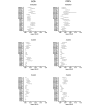Antibodies to citrullinated proteins and differences in clinical progression of rheumatoid arthritis
- PMID: 16207336
- PMCID: PMC1257421
- DOI: 10.1186/ar1767
Antibodies to citrullinated proteins and differences in clinical progression of rheumatoid arthritis
Abstract
Antibodies to citrullinated proteins (anti-cyclic-citrullinated peptide [anti-CCP] antibodies) are highly specific for rheumatoid arthritis (RA) and precede the onset of disease symptoms, indicating a pathogenetic role for these antibodies in RA. We recently showed that distinct genetic risk factors are associated with either anti-CCP-positive disease or anti-CCP-negative disease. These data are important as they indicate that distinct pathogenic mechanisms are underlying anti-CCP-positive disease or anti-CCP-negative disease. Likewise, these observations raise the question of whether anti-CCP-positive RA and anti-CCP-negative RA are clinically different disease entities. We therefore investigated whether RA patients with anti-CCP antibodies have a different clinical presentation and disease course compared with patients without these autoantibodies. In a cohort of 454 incident patients with RA, 228 patients were anti-CCP-positive and 226 patients were anti-CCP-negative. The early symptoms, tender and swollen joint count, and C-reactive protein level at inclusion, as well as the swollen joint count and radiological destruction during 4 years of follow-up, were compared for the two groups. There were no differences in morning stiffness, type, location and distribution of early symptoms, patients' rated disease activity and C-reactive protein at inclusion between RA patients with and without anti-CCP antibodies. The mean tender and swollen joint count for the different joints at inclusion was similar. At follow-up, patients with anti-CCP antibodies had more swollen joints and more severe radiological destruction. Nevertheless, the distribution of affected joints, for swelling, bone erosions and joint space narrowing, was similar. In conclusion, the phenotype of RA patients with or without anti-CCP antibodies is similar with respect to clinical presentation but differs with respect to disease course.
Figures



References
-
- Rantapaa-Dahlqvist S, de Jong BA, Berglin E, Hallmans G, Wadell G, Stenlund H, Sundin U, van Venrooij WJ. Antibodies against cyclic citrullinated peptide and IgA rheumatoid factor predict the development of rheumatoid arthritis. Arthritis Rheum. 2003;48:2741–2749. doi: 10.1002/art.11223. - DOI - PubMed
-
- Nielen MM, van Schaardenburg D, Reesink HW, van de Stadt RJ, van der Horst-Bruinsma IE, de Koning MH, Habibuw MR, Vandenbroucke JP, Dijkmans BAC. Specific autoantibodies precede the symptoms of rheumatoid arthritis: a study of serial measurements in blood donors. Arthritis Rheum. 2004;50:380–386. doi: 10.1002/art.20018. - DOI - PubMed
-
- Van Gaalen FA, van Aken J, Huizinga TW, Schreuder GM, Breedveld FC, Zanelli E, van Venrooij WJ, Verweij CL, Toes REM, de Vries RRP. Association between HLA class II genes and autoantibodies to cyclic citrullinated peptides (CCPs) influences the severity of rheumatoid arthritis. Arthritis Rheum. 2004;50:2113–2121. doi: 10.1002/art.20316. - DOI - PubMed
Publication types
MeSH terms
Substances
LinkOut - more resources
Full Text Sources
Other Literature Sources
Medical
Research Materials

